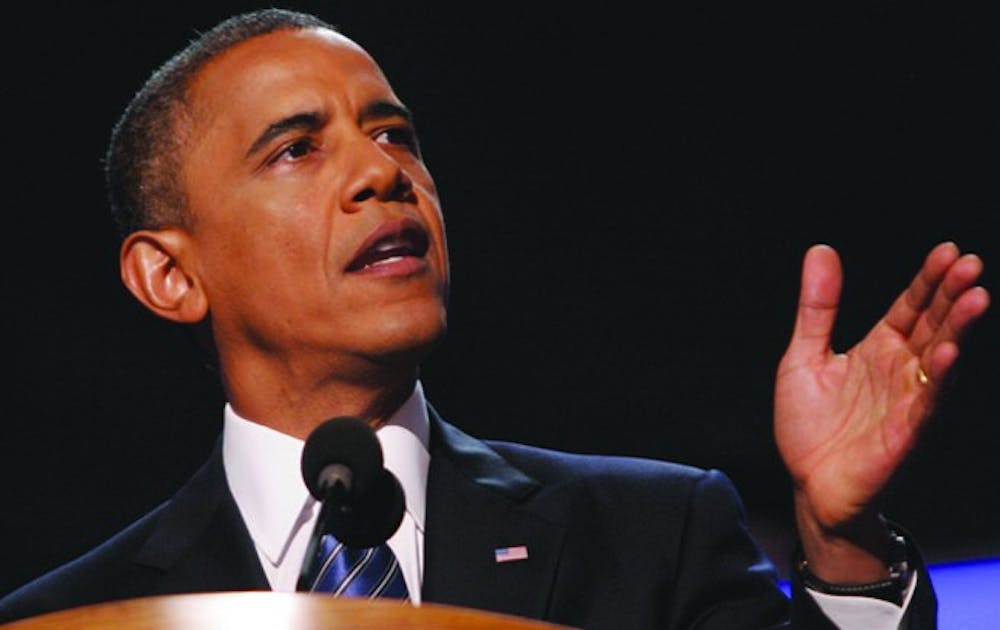Voters rally as the Democratic National Convention concludes and the presidential race surges forward.
Despite setbacks due to weather, the DNC presented a unified party front with events and speeches geared toward rallying voters, said Walton Robinson, communications director for the North Carolina Democratic Party. said. Hosted in Charlotte Sept. 4-6, the convention provided a venue for Democratic nominee President Barack Obama to outline his vision for the country. It also brought the state into the national scene, highlighting its importance as a battleground state.
“This city put on a great convention,” Robinson said. “We wanted to make sure that North Carolina and Charlotte were up to the challenge of being in the international spotlight.”
Some, however, criticized Obama’s speech for being more of the same. Junior Taylor Imperiale, president of Duke College Republicans, said he was disappointed that the convention and Obama’s speech were not more exciting.
“It was the same thing that we’ve heard,” he said. “It wasn’t anything new, and nothing overly exciting occurred.”
Despite such criticism, Gunther Peck, associate professor of public policy and history, said there was an element of honesty in the speech that reflected the president’s refusal to make promises he could not deliver with absolute certainty.
“What I appreciated was the level of humility in it,” Peck, who attended the DNC, said. “It’s much easier to be a candidate if you haven’t been the president.”
Officials from the Obama campaign said voter reaction to the president’s speech was better than four years ago, adding that the speech highlighted a clear choice on issues such as jobs, the economy, taxes, deficits, education and energy.
“He gave a home run speech and made a case for why he deserves another four years in office,” said Alejandra Salinas, former national president of College Democrats of America, who also gave remarks at the DNC. “It wasn’t a partisan speech…. It was a speech to everyone in this country.”
Duke Democrats President David Winegar, a sophomore, noted that the Google searches for “register to vote” doubled shortly following the convention, signifying the motivation inspired by the DNC.
“We are all looking forward to taking the energy from this convention and using it to keep Duke and North Carolina blue this November,” Winegar said.
Will it make a difference?
The convention focused on targeting undecided voters and invigorating the Democratic base, Peck said.
Yet the efficacy of conventions in garnering new voters remains in question, especially given that only a small portion of the electorate remains undecided, Peck added. With the partisn national media landscape—with Republicans generally gravitating toward Fox News and Democrats toward MSNBC—converting Republican voters depends heavily on whether they were exposed to the DNC at all.
Still, the convention successfully rallied the Democratic base, invigorating voters to actively campaign and get to the voting booth come Nov. 6, Peck noted.
An Obama campaign spokesman said the convention helped frame the election as a choice between two visions for the country’s future, which could ultimately help voter turnout. Moving forward in the elections, Obama must win Ohio and Florida.
“The biggest challenge is to get the Democratic base out to vote,” Peck said. “The convention tried to combat a sense of apathy about voting.”
Before the DNC, Obama and Romney were tied with 46.8 percent support, according to the Real Clear Politics average of polls. Following the DNC, Obama has surged in the polls, leading 49 percent to 45 percent, according to Gallup poll released Sunday. Although it is too soon to see if the surge can maintain momentum, or if it will drop like Romney’s post-RNC surge, according to a Rasmussen poll. Following the RNC, polls showed Romney ahead of Obama 48 percent to 44 percent.
Young voters rise
Although the effects on independent voters remain uncertain, the convention energized young voters because Obama has a positive vision for the future, Salinas said.
She added that throughout the convention, Obama demonstrated his commitment to young people by highlighting specific policies that he has already accomplished—such as Pell Grants and credit card reform—and that he intends to pursue if re-elected.
The economy—which poses major concerns for many young Americans looking to enter the job market—was one issue Obama successfully addressed, Salinas said.
Salinas, who graduated from the University of Texas-Austin in 2012, noted that there was a significant increase in the flow of interviewers and recruiters on campus from her freshman to her senior year. This increase attests to the economic improvements under the Obama administration, and will convince young Americans to re-elect him for another four years, she added.
Young Americans were also motiviated by Obama’s focus on a broad scope of issues, including marriage equality, women’s healthcare, reproductive rights and student loans, she added.
Peck reaffirmed the importance of the young American vote, noting that voters aged 18-24 carried Obama to victory in North Carolina in 2008—a state he won by only 0.3 percent.
He encouraged Duke students to take advantage of the on-campus voting site, adding that North Carolina's position as a battleground state provides a unique opportunity for playing a decisive role in the election.
“[Voting is] a part of... Duke engagement that sometimes is forgotten,” Peck said. “It’s not just about what’s happening globally but also right here at home.”
Get The Chronicle straight to your inbox
Signup for our weekly newsletter. Cancel at any time.

